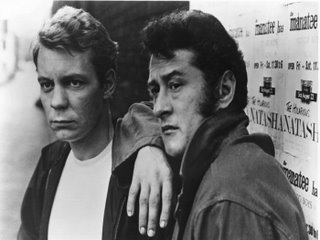The main characters in Donald Shebib’s 1970 landmark "Goin’ Down the Road" are such people. Peter McGraw and Joey Mayle are packing their car when we first meet them, and they don’t have any doubt in their minds – They’re going to conquer Toronto. They have that youthful piss-and-vinegar- I’m bulletproof aura, and as they drive, they let us in on their plans. They have a place to live lined up with a distant aunt, and jobs waiting for them courtesy of a fellow Nova Scotian.
Their plans hit a couple of snags early on. At the aunt’s house the occupants don’t even open the door, and watch the strange newcomers from behind the drapes. It’s obvious that nobody told THEM they would be having houseguests. Then, a phone call about their jobs comes up dry as well. The first night in Toronto is spent at the Salvation Army. It’s here that some doubt starts to set in, as Joey remarks "Maybe we should go back home, Pete." Pete is having none of that, and shows him a classified page with dozens of jobs. He remarks "I’d like to work in an office. I’d have a secretary…my name on the door."

The following day marks the beginning of their job search, and we follow Pete as he goes to an interview at an advertising agency. A condescending executive questions Pete and we feel as awkward as he does. The exec remarks "What made you want to apply here?" Joey is more realistic, and at the end of the day, he informs Pete that he has gotten a job loading cases of pop, and that Pete should go and apply, too.
The boys now have jobs, and watching them work, we think that this isn’t likely much better than what they’ve left behind. Pete certainly doesn’t think so, either, and says as much.
Pete also decides that he has an eye for the sexy Nicole, who comes in a couple of days a week. The other guys in the plant lust for her, but all think she’s unattainable. Pete manages to wangle a date with her, but the date consists of her dancing with her friends, and him sitting alone drinking in the corner. After dropping her off at home, Pete sees the rest of the guys spying from the parking lot, and hides in the entrance of the building rather than have them know he hasn’t slept with her.
Meanwhile, Joey has fallen in love with a waitress named Betty, and things move pretty quickly. He reveals to Pete that she is pregnant and that he is going to marry her.
We see Pete visiting the couple at their new apartment, and he remarks on all the new stuff they have. Joey proudly tells of the great deal he got, and that he doesn’t have to pay a cent until months later. This recklessness makes us cringe, and predictably enough, the two get laid off at the plant. Sinking into poverty, Joey and Betty (and Pete) move into a run-down apartment, and do whatever they can to survive - Washing cars, setting pins at a bowling alley, delivering newspapers.
There’s a terrific sequence where we watch the boys delivering newspapers. They eventually just say he hell with it, throw the papers away, and engage in a snowball fight, while Bruce Cockburn sings on the soundtrack:
"Just where do you belong, I’d like to know?"
As if in response, the film shows them quietly watching a ship on Lake Ontario at the end of the sequence.
There is a sad inevitability to the story, and we eventually find Pete and Joey at a supermarket filling a cart with groceries. They have a pathetic plan to steal the food, and an encounter with a perceptive clerk ends in violence. With no money, no prospects, the police now looking for them, a baby on the way, the boys come at a crossroads.
I will not spoil the finale for you, except to say that it is remarkable in its’ sadness and beauty. If you go back to the start of the film, Peter was the enthusiastic one, and Joey had his doubts. At the end of the film, we realize that the roles have reversed. Peter is pretty happy with their solution, but not Joey. Joey won’t be happy for a long time to come.
No comments:
Post a Comment